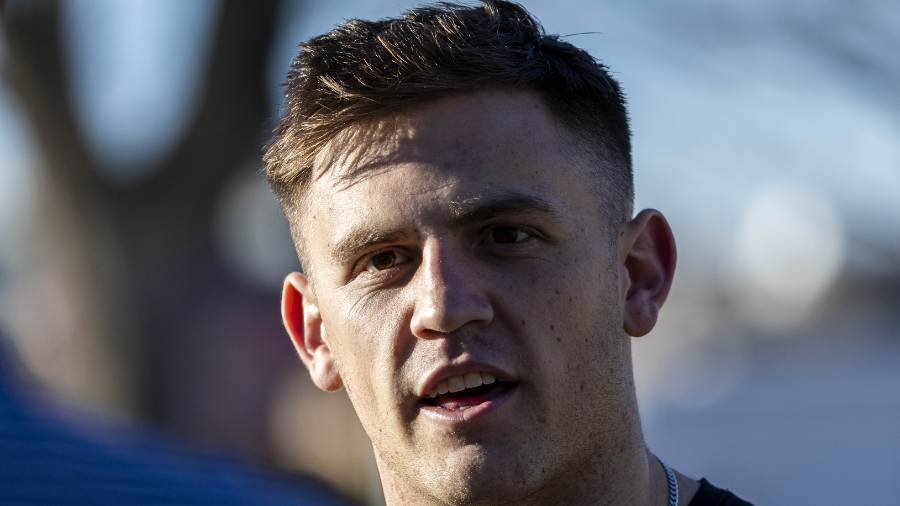Jake Retzlaff, a former quarterback for the BYU Cougars, has officially found a new home in college football. After a turbulent offseason marked by legal and institutional challenges, Retzlaff is set to continue his athletic journey at Tulane University. ESPN’s Pete Thamel reported that Retzlaff has committed to the Tulane Green Wave as a walk-on, signaling a fresh start for the redshirt senior who once stood as BYU’s projected starting quarterback.
Tulane, a member of the American Athletic Conference (AAC), was one of the programs speculated to be a potential destination for Retzlaff after his departure from BYU. The university reportedly spent over a week evaluating his eligibility and overall fit within their program. This process included an in-depth review by Tulane’s Title IX office due to the serious nature of the allegations Retzlaff faced earlier this year.
The need for a new quarterback was pressing for the Green Wave. Their previous starting quarterback, Darian Mensah, transferred to Duke, creating a vacuum at the position. Tulane’s quarterback room is now made up of several transfers from various schools, including Brendan Sullivan from Iowa, Kadin Semonza from Ball State, and Donovan Leary from Illinois. With Retzlaff joining the mix, head coach Jon Sumrall will have multiple options as he prepares for his second season at the helm. Tulane finished 9-5 in Sumrall’s debut season and will kick off their 2025 campaign against Northwestern at Yulman Stadium.
Retzlaff’s time at BYU came to a dramatic and controversial end. On May 21, a civil lawsuit was filed against him, alleging sexual assault. Though the case was ultimately dismissed on June 30, it cast a long shadow over his status at the school. Despite the legal dismissal, sources indicated that BYU’s Honor Code office had been preparing to suspend him due to its strict moral conduct standards, which often remain in effect regardless of legal outcomes.
This looming institutional discipline likely played a major role in Retzlaff’s decision to part ways with BYU. On July 11, he issued a public statement announcing his formal withdrawal from both the university and the football program. In his message, Retzlaff expressed a deep emotional connection to his time at BYU, describing it as a period of significant growth—spiritually, mentally, and physically. He thanked his teammates, coaches, and fans for their support and stated that his experiences in Provo would always remain with him.
“After a lot of prayer, reflection, and conversations with those I trust,” his statement read, “I’ve made the difficult decision to officially withdraw from BYU and step away from the BYU Football program.”
He continued with optimism for what lies ahead, saying, “That said, I’m excited to turn the page and embrace the next chapter. My journey is far from over – and I’m more motivated than ever to keep chasing my goals.”
Retzlaff’s fall from BYU’s clear front-runner at quarterback to transferring as a walk-on at Tulane was swift. Just a few months earlier, in March, he had emerged from spring practices as the top quarterback on BYU’s roster. Coaches and insiders viewed him as the leader to take the first snap under center when the 2025 season began. His commanding performance and experience gave the program hope heading into the season, making his sudden exit all the more jarring.
The move to Tulane offers Retzlaff a shot at redemption. Although he enters the program as a walk-on rather than a scholarship athlete, his experience and past status as a starter at a Power Five school give him a unique edge in the quarterback competition. Tulane, having revamped its quarterback depth through multiple transfers, now has the opportunity to evaluate how Retzlaff fits into their offensive scheme.
His arrival also puts head coach Jon Sumrall in a potentially advantageous position. With a stable of experienced quarterbacks from different football systems, Sumrall has the flexibility to tailor his offense to the skill set of whoever ultimately wins the job. Retzlaff, with his dual-threat capability and high football IQ, could prove to be a valuable asset in the AAC if he can earn a spot on the depth chart.
This transfer also raises broader questions about how college programs approach player conduct issues and institutional accountability. Tulane’s week-long vetting process, particularly the involvement of the Title IX office, indicates a careful and deliberate approach to ensure that Retzlaff’s presence wouldn’t violate the university’s values or policies. This stands in contrast to some past transfer cases in college football, where due diligence appeared rushed or absent.
Meanwhile, for BYU, Retzlaff’s departure closes a difficult chapter. His absence leaves questions about the Cougars’ quarterback situation going into the 2025 season. The program now has to reassess its depth chart and potentially develop younger talent under center sooner than anticipated.
While Retzlaff’s journey has been marred by controversy, his commitment to Tulane marks the beginning of a potential comeback story. The move may be seen by some as a second chance—an opportunity to rehabilitate both his football career and public image. Whether or not he capitalizes on this chance remains to be seen, but the 2025 season will be pivotal for both his athletic future and personal redemption.
In summary, Jake Retzlaff’s transfer to Tulane represents a new chapter following a rocky departure from BYU triggered by legal trouble and institutional scrutiny. With the lawsuit dismissed and a new program willing to give him a fresh start, the former Cougar now has the opportunity to redefine his path in college football. Tulane, in turn, has added another capable player to a competitive quarterback room as they aim to build on last season’s 9-5 performance under a rising head coach. The spotlight will surely follow Retzlaff this season—not just for what he does on the field, but for how he navigates the aftermath of the events that brought him to New Orleans.



